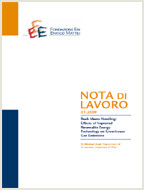Simulating a Sequential Coalition Formation Process for the Climate Change Problem: First Come, but Second Served?

25.11.2009
Michael Finus, Bianca Rundshagen and Johan Eyckmans
C79, H87, Q54
International Climate Agreements, Sequential Coalition Formation, Coordination through Moderator, Integrated Assessment Model, Algorithm for Computations
Climate Change and Sustainable Development
Carlo Carraro
We analyze stability of self-enforcing climate agreements based on a data set generated by the CLIMNEG world simulation model (CWSM), version 1.2. We consider two new aspects which appear important in actual treaty-making. First, we consider a sequential coalition formation process where players can make proposals which are either accepted or countered by other proposals. Second, we analyze whether a moderator, like an international organization, even without enforcement power, can improve upon globally suboptimal outcomes through coordinating actions by making recommendations that must be Pareto-improving to all parties. We discuss the conceptual difficulties of implementing our algorithm.
